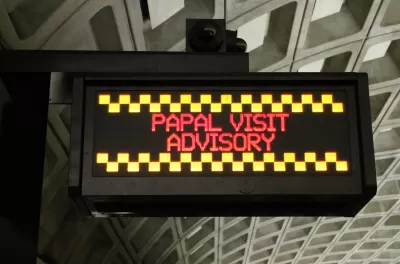Pope Francis' much-publicized visit to the capital in late September saw reductions in congestion and better travel times. Event-specific telecommuting policies and transit route changes appear responsible for the minor miracle.

Against all intuition, Pope Francis' visit to Washington, D.C. this September resulted in less overall traffic, not more. The region's Transportation Planning Board reported on the statistics.
From the report: "Overall, a modest reduction in traffic volumes led to a significant reduction in congestion and an even larger improvement in travel time reliability on freeways, and transit ridership notably declined for the week."
As for causes, Robert Thomson notes, "The federal Office of Personnel Management asked federal agencies to allow employees to telework, adjust their work hours or take time off. Many other employers also allowed telework and flexible work hours policies."
Thomson goes on, "Other factors may have been involved. Sept. 23 was Yom Kippur, and schools were closed in some jurisdictions. Also, some local transit services reduced or rerouted their buses on the roadways that were most likely to be congested during the visit." In other words, the good traffic was likely a one-time deal.
FULL STORY: What Pope Francis did for D.C. traffic

Planetizen Federal Action Tracker
A weekly monitor of how Trump’s orders and actions are impacting planners and planning in America.

Maui's Vacation Rental Debate Turns Ugly
Verbal attacks, misinformation campaigns and fistfights plague a high-stakes debate to convert thousands of vacation rentals into long-term housing.

San Francisco Suspends Traffic Calming Amidst Record Deaths
Citing “a challenging fiscal landscape,” the city will cease the program on the heels of 42 traffic deaths, including 24 pedestrians.

Defunct Pittsburgh Power Plant to Become Residential Tower
A decommissioned steam heat plant will be redeveloped into almost 100 affordable housing units.

Trump Prompts Restructuring of Transportation Research Board in “Unprecedented Overreach”
The TRB has eliminated more than half of its committees including those focused on climate, equity, and cities.

Amtrak Rolls Out New Orleans to Alabama “Mardi Gras” Train
The new service will operate morning and evening departures between Mobile and New Orleans.
Urban Design for Planners 1: Software Tools
This six-course series explores essential urban design concepts using open source software and equips planners with the tools they need to participate fully in the urban design process.
Planning for Universal Design
Learn the tools for implementing Universal Design in planning regulations.
Heyer Gruel & Associates PA
JM Goldson LLC
Custer County Colorado
City of Camden Redevelopment Agency
City of Astoria
Transportation Research & Education Center (TREC) at Portland State University
Jefferson Parish Government
Camden Redevelopment Agency
City of Claremont





























